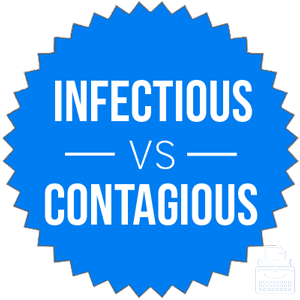What is the difference between an infectious disease and a contagious disease?
The words infectious and contagious are confusing to many writers because they seem to describe the same thing: communicable diseases. It doesn’t help that some illnesses are both infectious and contagious.
These words have distinct meanings, though, and careful writers are sure to use each one appropriately to strengthen their writing.
What is the Difference Between Infectious and Contagious?
In this post, I will compare infectious vs. contagious. I will use each of these words in at least one example sentence, so you can see how it appears in context.
Plus, I will show you a helpful memory tool that makes it easier to choose whether infectious or contagious is the correct word in any given situation.
When to Use Contagious
 What does contagious mean? Contagious is an adjective that means able to be passed from one person to another. Think of it as a synonym of communicable in the phrase communicable disease.
What does contagious mean? Contagious is an adjective that means able to be passed from one person to another. Think of it as a synonym of communicable in the phrase communicable disease.
Most of the time, we use contagious to describe diseases or other illnesses. Sometimes, though, things like laughter and yawns are also said to be contagious.
Here are a few more examples,
- Kari kept her daughter home from school all last week because she had the flu and was very contagious.
- Some conditions, like pink eye, are very contagious, while others like eczema are not very contagious at all.
Usually, when people have a contagious disease, they must avoid or minimize direct contact with other people. This avoids spreading the illness. Sometimes, strategies like covering your mouth when you cough are enough to stop the spread of a disease.
In other cases, you must isolate yourself for an extended time until you are well enough again.
The important takeaway from the word contagious is that the disease is spread through human contact. In other words, you need to be in contact with the sick person to get the disease.
When to Use Infectious
 What does infectious mean? Infectious is another adjective. It means spread via the environment, and like contagious, usually refers to diseases. Infectious diseases are usually caused by bacteria, viruses, or parasites.
What does infectious mean? Infectious is another adjective. It means spread via the environment, and like contagious, usually refers to diseases. Infectious diseases are usually caused by bacteria, viruses, or parasites.
For example,
- Botulism and Diphtheria are two dangerous infectious diseases.
- Alzheimer’s disease and bipolar disorder are concerning maladies, but they are not infectious.
The important takeaway from the word infectious is that the disease is spread through the environment, e.g., water, air, food, etc.
Many people use infectious and contagious synonymously. Even the State of Rhode Island Department of Health combines infectious and contagious diseases under the heading infectious. As careful writers, though, we must be sure not to do the same.
Trick to Remember the Difference?
 You may have noticed that contagious and infectious have significant overlap in their meanings—they both refer to the spread of disease.
You may have noticed that contagious and infectious have significant overlap in their meanings—they both refer to the spread of disease.
The crucial difference between these words is that an infectious disease is spread through the environment, like through the air or drinking water. A contagious disease is spread through contact with an already sick person.
Contagious vs. Infectious Check: Infectious and environment both contain the letter E, so it is easy to remember that infectious diseases are spread through the environment.
Summary
Is it contagious or infectious? Contagious and infectious are adjectives that describe how diseases are spread.
- Contagious diseases can be spread from person to person.
- Infectious diseases are spread via the environment.
While the words are often used interchangeably, their meanings are distinct.
Contents
